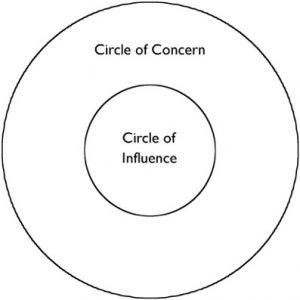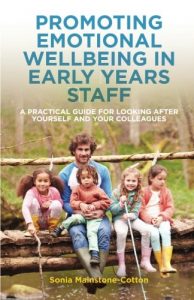 A blog by Sonia Mainstone-Cotton.
A blog by Sonia Mainstone-Cotton.
Earlier this month (June ‘18) Pre-school Learning Alliance released their Minds Matter[1] report looking at the impact working in the early years sector is having on staff mental health and wellbeing. A quarter of all respondents to their survey said they were considering leaving the profession due to stress. Many of the reported symptoms included fatigue, loss of motivation, anxiety and insomnia. 52% of the respondents had not spoken to anyone at work about the stress they were experiencing or their mental health issues.
Reasons cited for the industry high levels of stress included low pay, increased paperwork, financial resources of the setting, and poor work-life balance.
When I read the report and the quotes I was struck by the desperation and the sense of hopelessness that many are feeling. The report concludes by recognising that there is a need for change in paperwork and administration, an increase in early years funding and guidance on how to improve discussions about stress and mental health. I agree with the conclusions, however, I also feel as practitioners/colleagues/managers that there are things we can do to support our own wellbeing, we can put things in place to support one another. I felt many of the comments show a sense of hopelessness and lack of control, which is totally understandable, however, I firmly believe there are things we can all do, that is within our control that can help our wellbeing.
Often when we feel highly stressed and anxious it is really hard to see clearly what we have control over and can change. So often we spend huge amounts of time worrying about things we can’t change. There is a useful exercise called the circle of concern and influence, created by Stephen Covey (2013). The diagram below shows what it looks like.

The outer circle is the circle of concern, in here you label all the things that concern you, the inner circle is the circle of influence, in here you write down the things you can influence and have some control over. This is a useful tool to help reflect on the things you can change, and have some control over. It can help give you ideas about how and what you spend your emotional and physical time and energy on. This could be used individually or in supervision.
The report had many quotes about deep tiredness and lack of sleep, research has shown adults need between 7-9 hours of sleep, if we regularly don’t get enough sleep this leads to poor mental and physical health. We need to put in place good sleep habits, these can include:
- Having a sleep routine e.g. same time each day
- Having a relaxing bedtime routine e.g. hot drink such as Chamomile tea; warm bath; read of a book
- Not having caffeine and alcohol, or smoking before sleeping
- Turning off devices such as phones, laptops, tablets at least an hour before bed
Often we can feel overwhelmed by the stress and anxiety, and it becomes really hard to see anything positive. I encourage the staff I work with to do one small thing each day which makes them happy. This sounds overly simplistic, but so often when we think about wellbeing we can feel it is too big to take on. By taking small steps towards improving our wellbeing this can help us to bring about some change. By finding and doing one thing each day which makes you happy, this can begin to bring the change you want to see. It may be something small such as walking in the park, going for a run, reading a book, or sitting in the garden for 5 minutes with a cup of tea. These small things are a way to help you, these small things are about you taking care of yourself and being kind to yourself.
Within our work, we need to have open and honest conversations about how we are feeling. We talk about the need to have good emotional language and vocabulary with the children we work with, but we also need to have the same amongst the adults. In team meetings and supervision we need to check in with one another, there needs to be a safe environment to be able to do this. Managers need to lead by example. Show that is ok for staff to say how they are feeling. Team meetings and staff supervision should both have time within them to check in with one another. Team meetings and supervision should both have wellbeing on their agendas. Offer wellbeing ideas to one another, support each other in improving wellbeing, talk about it, be honest about it and encourage one another to make changes.
 For further ideas on staff wellbeing see my book Promoting Emotional Wellbeing in Early Years Staff.
For further ideas on staff wellbeing see my book Promoting Emotional Wellbeing in Early Years Staff.
[1] https://www.pre-school.org.uk/sites/default/files/minds_matter_report_pre-school_learning_alliance.pdf
If you would like to read more articles like this and get the latest news and offers on our early years books, why not join our mailing list? We can send information by email or post as you prefer. You may also be interested in liking our Special Ed, PSHE and Early Years Resources Facebook page.
I would ask, what has changed since my doctoral study? To quote:
‘The wellbeing of practitioners has been brought into question through this investigation. I suggest that the absence of professional wellbeing negates attempts to retain them in Day nurseries. The presence of wellbeing is likely to have an impact on the ‘mobile’ workforce and is an area for further research. Moreover, I recommend that those of us who
are concerned with the welfare and education of children should focus for a moment on the welfare of practitioners who provide their education and care. We should be proactive in offering funded creative opportunities for reflective practice with the aims of assuring practitioners that we value them and care enough to help safeguard their wellbeing.’ Retention of Early Years Practitioners in Day Nurseries
http://irep.ntu.ac.uk/id/eprint/209/1/211560_Simms%20Retention%20of%20Early%20Years.pdf Dr Margaret Simms